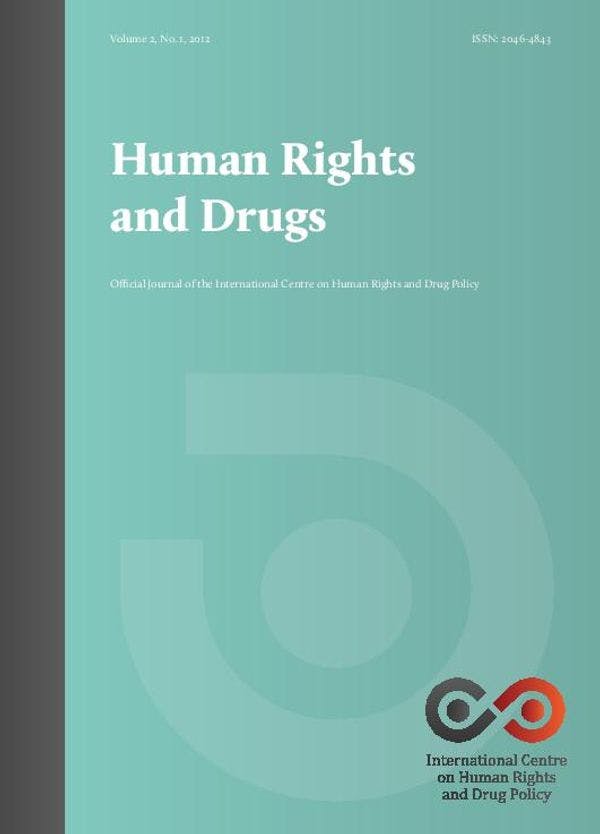Human Rights and Drugs
We are pleased to welcome you to the second volume of Human Rights and Drugs, the official journal of the International Centre on Human Rights and Drug Policy.
This edition of Human Rights and Drugs is a product of that growing interest, and we are pleased to present new research and analysis in a broad range of topic areas. Indeed, the content of this second issue of the journal could not be more timely and relevant, particularly as the contributions reflect on - and offer thoughtful contrasts to - the recent work of the International Narcotics Control Board (INCB), the treaty body established by the UN drug conventions to oversee their implementation. For example, the Board has recently refused to take a position on either the death penalty for drug offences or drug detention centres, putting it at odds with the clear positions on these issues expressed by UN human rights bodies, as explored in two articles in this journal.
The issue of compulsory detention of people who use (or are suspected of using) drugs for the purpose of ‘drug treatment’ is one that has received substantial attention in recent years from both the NGO community and from United Nations agencies. In his article, ‘The ethics and effectiveness of coerced treatment of people who use drugs’, Alex Stevens of the University of Kent uses established standards of human rights and medical ethics to judge whether it is ethical to apply two types of coerced treatment to three groups of drug users. Stevens argues that compulsory treatment is not ethical for any group of people who use drugs, as it breaches the standard of informed consent. Quasi-compulsory treatment (i.e. treatment that is offered as an alternative to a punishment that is itself ethically justified) may be ethical under specified conditions for drug dependent offenders who are facing a more restrictive penal sanction, but is not ethical for other people who use drugs.
Yingxi BI’s article ‘On the Death Penalty for Drug-Related Crime in China’ continues and expands the journal’s interest in the human rights implications of capital punishment for drug offences. Referencing a variety of Chinese and international sources, BI examines China’s criminal justice legislation and explores the debates surrounding the death penalty for drug-related offences from the perspectives of penology and human rights. Building on this base, BI discusses strategies for the restricting and possible abolition of the death penalty for drugs in China.
The INCB has also publicly criticised the Supreme Court of Canada for its 2011 ruling on the INSITE safe injecting facility in Vancouver. Sandra Ka Hon Chu reviews the decision in the case of Attorney General v. PHS Community Services Society, in which the Court ruled unanimously that the Government’s refusal to grant an exemption to INSITE from criminal prohibition for drug possession violated the Canadian Charter of Rights and Freedoms. Lines & Barrett | Introduction Human Rights and Drugs (2012) 5 A critique of the Board’s work on the issue of psychoactive plants is the subject of a specific contribution. In ‘Plants, Psychoactive Substances and the International Narcotics Control Board: The Control of Nature and the Nature of Control’, Kenneth Tupper and Beatriz Caiuby Labate examine the approach of the Board to the question of plant materials containing psychoactive substances, with specific reference to its work on contemporary practices of ayahuasca drinking. Tupper and Labate argue that the Board’s recommendations against ayahuasca represent an attempt to extend the scope of its powers, while conflating and thus misrepresenting widely diverse plant materials and their effects.
We are also pleased to present two other contributions on issues of overall significance to human rights and drug control.
Efforts to control narcotic drugs are often legitimised as necessary to protect children and young people. In ‘Article 33 of the Convention on the Rights of the Child: The Journey from Drafting History to the Concluding Observations of the Committee on the Rights of the Child’, Dr Khadeija Mahgoub of the University of Khartoum explores the evolving interpretation of drug use issues within the Concluding Observations of the Committee. Her work reveals a clear connection between article 33 and the right to health as well as a dynamic interpretation of the article by the Committee. She recommends that the Committee develop a General Comment on article 33.
Finally, Tim Bingham summarises the decision of the Irish Press Ombudsman in the case of International Harm Reduction Association and Others and The Irish Independent, in which a number of drug services took a complaint against a major newspaper in Ireland for alleged prejudicial speech against people who use drugs.
Keep up-to-date with drug policy developments by subscribing to the IDPC Monthly Alert.
Downloads
Topics
Regions
Related Profiles
- International Narcotics Control Board (INCB)
